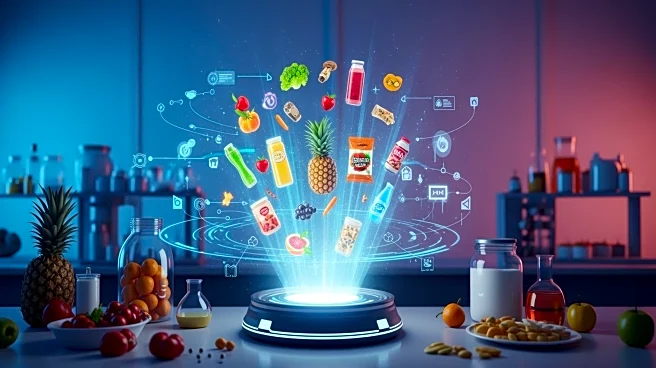What's Happening?
Mintel, a market research company, has released its 2026 Food and Drink Predictions report, identifying three major trends expected to shape the food and beverage industry. The first trend, 'retro rejuvenation,'
involves brands incorporating traditional wisdom into product innovations to create emotional and cultural connections. Jenny Zegler, director of food and drink at Mintel, explains that consumers are seeking comfort in nostalgia amid a volatile world. The second trend, 'maxxing out,' highlights the use of artificial intelligence (AI) by consumers to diversify their nutritional intake, moving beyond focusing on specific components like protein or fiber. AI will help consumers shuffle their diets to include a variety of ingredients, encouraging the trial of new foods. The final trend, 'intentionally sensory,' focuses on product developers enhancing textures, aromas, and appearances to stimulate the senses and create experiential eating experiences.
Why It's Important?
These trends reflect significant shifts in consumer preferences and technological integration in the food and beverage industry. The emphasis on nostalgia and sensory experiences suggests a growing demand for products that offer emotional and experiential value. The use of AI in diversifying diets indicates a move towards personalized nutrition, which could lead to increased innovation in food products and marketing strategies. Companies that adapt to these trends may gain a competitive edge by meeting evolving consumer expectations. The focus on sensory experiences also highlights the potential for brands to differentiate themselves through unique product offerings, potentially driving sales and brand loyalty.
What's Next?
As these trends unfold, food and beverage companies are likely to invest in research and development to create products that align with consumer desires for nostalgia, diversity, and sensory stimulation. The integration of AI in dietary planning may lead to collaborations between tech companies and food brands, enhancing personalized nutrition solutions. Brands may also explore partnerships with cultural and culinary experts to incorporate traditional wisdom into modern products. The industry could see an increase in marketing campaigns that emphasize emotional connections and experiential eating, potentially reshaping consumer engagement strategies.
Beyond the Headlines
The focus on nostalgia and sensory experiences may have broader cultural implications, reflecting a societal desire for comfort and simplicity in uncertain times. The use of AI in nutrition could raise ethical questions about data privacy and the influence of technology on personal health choices. Additionally, the emphasis on sensory stimulation may lead to discussions about the impact of food aesthetics on consumer behavior and health. These trends could also influence regulatory policies related to food labeling and marketing practices.










